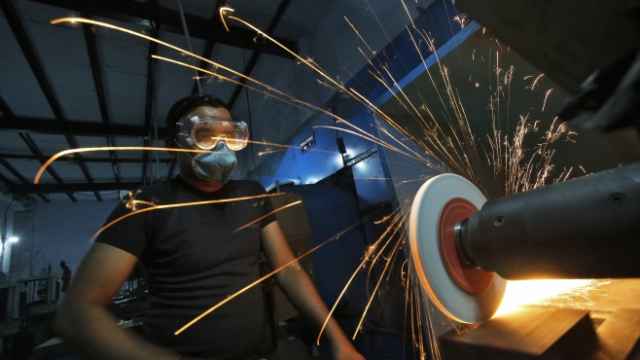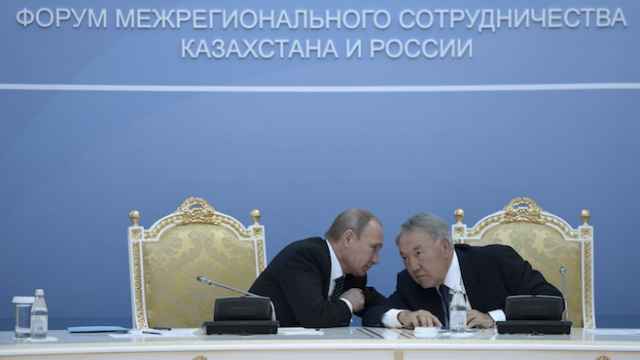Economic growth in the Caucasus and Central Asia, or CCA, is set to weaken this year and next, hit by a slowdown in Russia, the region's key trading partner and source of remittances and investment, the International Monetary Fund said Tuesday.
The region, which includes eight ex-Soviet states sprawling from the Black and Caspian seas to Siberia, Iran and China, will see its economic growth slow to about 5.5 percent in 2014-15, 0.75 percentage point lower than projected in the Fund's outlook in May.
IMF economists divide the region into hydrocarbon exporters Azerbaijan, Kazakhstan, Turkmenistan and Uzbekistan and oil and gas importing Armenia, Georgia, Kyrgyzstan and Tajikistan.
"A further deepening of geopolitical tensions between Russia and Ukraine could have a significant impact on the CCA region, over both the near and medium term," the IMF said in an updated regional outlook.
The price of oil, Russia's major export, has dwindled by about $30 per barrel in recent months to around $85-86, while Moscow is also feeling the effect of its weakening ruble currency and Western sanctions imposed over its role in the Ukraine crisis.
Russia's Central Bank expects gross domestic product to rise by just 0.4 percent in this year. Economy Minister Alexei Ulyukayev said last month there were "very big risks" that Russia's growth could turn negative in 2015 if oil prices remained close to present levels.
"A protracted period of smaller growth in other trading partners, particularly Europe or China, would also affect external demand," the IMF said. "Domestic risks stem from reversals in growth-enhancing structural reforms, especially in the areas of governance and competition."
Big or Small — All Take a Blow
Kazakhstan's GDP, by far the biggest in the region, is forecast to grow by 4.6 percent this year and 4.7 percent in 2015, the Fund said, compared with a 6-percent rise in 2013.
The country of 17 million is Russia's close trading partner. Together with Belarus, they plan to launch the Eurasian Economic Union, or EEU, on Jan. 1, 2015.
Delayed output from the giant Kashagan oilfield, launched in September last year but halted a few weeks later due to gas leaks from its pipelines, also weighs on Kazakhstan's growth, the IMF said.
In oil-rich Caspian neighbor Azerbaijan, GDP growth is expected to slow to 4.5 percent this year and further to 4.3 percent in 2015 from last year's 5.8 percent, mainly reflecting weaker growth in domestic demand, it said.
Despite two decades of strong economic growth, poverty and inequality rates are still high in the region.
In energy-hungry Kyrgyzstan and Tajikistan, where per capita GDP is less than one tenth of that in Kazakhstan, Russia's slowdown is felt through smaller volumes of cash remittances sent home by migrant workers, the IMF said.
Besides, a weakening of the Russian ruble is putting pressure on the Tajik and Kyrgyz currencies, feeding quickly into inflation, it said.
In the region's oil importers, economic growth is forecast to fall from an average of 5.6 percent in 2013 to 4.6 percent this year, despite the expected recovery in Georgia, where national GDP growth is set to accelerate to 5.0 percent in 2014 from 3.2 percent last year.
A Message from The Moscow Times:
Dear readers,
We are facing unprecedented challenges. Russia's Prosecutor General's Office has designated The Moscow Times as an "undesirable" organization, criminalizing our work and putting our staff at risk of prosecution. This follows our earlier unjust labeling as a "foreign agent."
These actions are direct attempts to silence independent journalism in Russia. The authorities claim our work "discredits the decisions of the Russian leadership." We see things differently: we strive to provide accurate, unbiased reporting on Russia.
We, the journalists of The Moscow Times, refuse to be silenced. But to continue our work, we need your help.
Your support, no matter how small, makes a world of difference. If you can, please support us monthly starting from just $2. It's quick to set up, and every contribution makes a significant impact.
By supporting The Moscow Times, you're defending open, independent journalism in the face of repression. Thank you for standing with us.
Remind me later.





